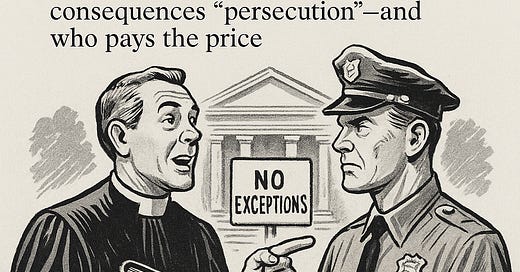Tax-Exempt, Above the Law, and Still Playing the Victim
Pam Bondi’s anti-bias task force isn’t defending faith. It’s defending dominance.
Pam Bondi recently launched a federal task force aimed at investigating so-called "anti-Christian bias."
At first glance, it might sound like a noble mission—protecting the rights of people of faith, ensuring religious liberty, and shielding Americans from unfair treatment based on their beliefs.
But when you actually look at the examples the task force points to, a very different picture emerges.
A university fined for violating anti-discrimination laws.
A hospital required to follow safety regulations that apply to everyone else.
A military officer denied a religious exemption to a public health order.
These are not examples of oppression. They are examples of accountability. They are the basic expectations of any pluralistic, secular society—one where no institution, religious or not, gets a free pass to break the rules.
So what is this task force really about?
It’s not about defending Christianity. It’s about preserving Christian power from the consequences of equality.
Reframing Accountability as Persecution
This is a classic move in the Christian nationalist playbook:
Take legitimate consequences for rule-breaking and reframe them as religious persecution.
Take anti-discrimination laws and frame them as an attack on faith.
Take the expectation to serve all members of the public and paint it as a violation of conscience.
What we’re witnessing isn’t anti-Christian bias. What we’re witnessing is a slow erosion of religious privilege—and the backlash from those who were never used to playing by the same rules as everyone else.
Christian nationalism thrives on victimhood. Not real persecution, but manufactured outrage. It’s not about stopping oppression—it’s about stopping equality from catching up.
And now, the federal government is helping create the illusion that Christian power is under siege.
Follow the Money: The Tax Exemption Hypocrisy
Here’s the part they don’t want you to notice:
Religious institutions in the U.S. are already massively subsidized by taxpayers. They don’t pay property taxes. Their clergy receive housing allowances tax-free. They’re exempt from income tax, capital gains tax, and often sales tax as well.
A 2012 analysis by Ryan T. Cragun (University of Tampa) estimated that tax exemptions for religious organizations cost the U.S. over $71 billion annually. And that was more than a decade ago. Factoring in inflation and growth in religious real estate and income streams, updated 2023 estimates from secular watchdog groups now place the number between $100–120 billion per year in lost tax revenue.
So when a church-run hospital is fined for refusing to follow public health policy, or when a religious school is told it can’t discriminate against LGBTQIA+ students and still receive public funding, we’re not watching religious freedom being trampled.
We’re watching tax-exempt institutions complain that they’re being asked to play by the rules—rules that every other public institution is required to follow.
Let’s do the math:
A one-time fine for violating civil rights laws? Tens or hundreds of thousands.
Annual tax breaks for megachurches and affiliated networks? Millions. In some cases, tens of millions.
For example, Joel Osteen’s Lakewood Church is estimated to forgo over $1.5 million annually in property taxes alone—just for the primary campus. That doesn’t include subsidies from non-profit status, housing allowances, or state-level exemptions.
The real injustice isn’t that religious institutions are facing consequences. The real injustice is that they’ve gone this long without them.
Religious freedom does not mean freedom from accountability. Religious belief does not mean legal immunity. And tax exemption is not a shield against scrutiny.
From Faith to Force
This task force isn’t about faith. It’s about force. It’s about embedding Christian nationalist ideology deeper into the mechanisms of government—and framing any resistance as religious discrimination.
It’s about stoking fear among conservative Christian voters. It builds the case for rolling back civil rights protections. And it turns religion into a political shield—one that demands immunity, not equality.
But let’s be clear: disagreement is not bias. Legal accountability is not persecution. And refusing to let one religion dictate public policy is not anti-Christian—it’s pro-democracy.
The next time you hear someone invoke “anti-Christian bias,” look closer.
Are they being prevented from worshiping? Or are they being prevented from using religion as a shield to break laws, discriminate freely, or dodge accountability?
Because that distinction matters.
This isn’t about persecution. It’s about power. And those used to dominance will always see equality as an attack.
Coming soon for subscribers: A behind-the-scenes reflection on how I used to see these cases as persecution too—and what changed my perspective. If you want the personal side of this story, consider becoming a paid subscriber to support this work and unlock the next post.
👉 $6.66/month. Because once you’ve been told the devil’s number your whole life, it’s poetic to reclaim it for reason.




